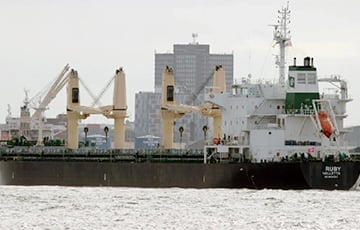EU Ports Refuse To Let In Vessel With Russian Fertilisers Over Suspicions Of ‘Megabomb’
5- 7.10.2024, 10:09
- 6,452

Europe is afraid of repeating the incident in Beirut.
The Malta-flagged cargo ship ‘Ruby’ with Russian fertilisers, which was damaged on its way to Africa, has not been allowed into EU ports for several weeks because of concerns about possible detonation of ammonium nitrate carried on board, The New York Times (NYT) reports.
According to the publication, the bulk carrier left the port in Kandalaksha in Murmansk region on August 22. It was to deliver the cargo - 20 thousand tonnes of ammonium nitrate - to Africa. However, shortly after leaving the port, the vessel ran aground and suffered damage to the hull, propeller and rudder.
The situation forced the ship's captain to start cruising off the coasts of Northern European countries in search of assistance. Norway allowed the damaged vessel to enter the port in Tromsø, where it stayed from September 1 to 4. In Norway, the vessel was inspected and minor repairs were carried out. The inspectors concluded that the damage did not affect the cargo and that the fertiliser itself did not pose a threat, but still ordered the ship to be repaired elsewhere. The inspectors insisted that the bulk carrier ‘Ruby’ be accompanied by a tugboat.
The crew of the vessel was planning to go to the Baltic, in particular to Lithuania, for repairs. However, the country's Prime Minister Ingrida Shimonite said in Parliament that the bulk carrier would be denied entry to the port in Klaipeda.
Maltese authorities also did not allow the vessel to dock, although it flies the Maltese flag and belongs to a company registered in the island nation. The Captain was required to unload ammonium nitrate before entering the local port.
The Ruby then sailed back north towards the UK. When the ship was close to British shores, former Lithuanian ambassador to the kingdom Eitvydas Bajarunas wrote in a column for a European think tank that the ship is a ‘floating megabomb’. In this regard, Bajarunas warned of possible Russian sabotage. This drew the attention of the British media.
‘Unfortunately, due to the media speculation that has spread around this vessel, UK port terminals are now not willing to accommodate the vessel,’ said Emirates-based Serenity Shipping, which manages the ship.
As the NYT notes, Europe is afraid of repeating the incident that occurred in the port of Beirut, where 2,750 tonnes of ammonium nitrate exploded on August 4, 2020. The explosion was caused by welding work being carried out in an ammonium nitrate warehouse. As a result, 280 people were killed, another 7 thousand were injured, about 300 thousand were left homeless. The economic damage from the disaster exceeded $15 billion. After the explosion, protests began in the country, during which the Lebanese government resigned in full.
At that, the exploded ammonium nitrate had been in the port of Beirut since 2014. It was seized from a ship called Rhosus, whose owner was Igor Grechushkin, a native of Khabarovsk living in Cyprus. According to seafarers working on the ship, Grechushkin went bankrupt and ‘actually abandoned the vessel’.











